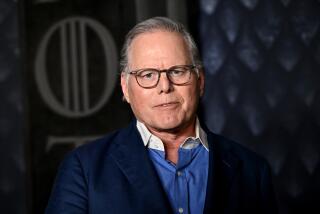Scandal Drops Salomon Profits 30% : Earnings: The decline is blamed on customer unease over the continuing Treasury bond investigations.
NEW YORK — Salomon Inc.’s first-quarter earnings dropped 30% because of customer uneasiness over government investigations into the Treasury bond scandal at its Salomon Bros. unit, the firm said in a statement to shareholders at its annual meeting Wednesday.
The announcement also said the Wall Street firm will need to add an unspecified amount to the $200-million reserve set up to cover fines, legal fees and other costs associated with the wrongdoing. Actual amounts eventually required, the firm warned, “may differ materially from the established reserve.”
Interim Chairman Warren E. Buffett, in an answer to shareholder questions, said that certain “other matters” have arisen in the course of the government investigations that “could involve other firms and may be broader than (just the) Treasury matter.” He did not explain.
But he added: “We believe we have disclosed what is material to the company.” Buffett said he cannot predict when the investigations will be complete, and he declined to answer further questions regarding Salomon’s legal problems.
Buffett also told shareholders that the company does not plan to spin off its Phibro Energy unit, as has been frequently speculated. And he reiterated that the board will consider naming a permanent successor as chairman and chief executive upon resolution of the government investigation into Salomon’s bidding activities in U.S. Treasury auctions.
Salomon earned $190 million on revenue of $1.9 billion for the quarter ended March 31, compared to $273 million on revenue of $2.7 billion in the first quarter of 1991. Per-share earnings were $1.51, or $1.41 fully diluted, compared to $2.30, or $2.06 fully diluted, the previous year.
The firm blamed customers’ reluctance to grant new-issue underwriting and investment-banking assignments, plus a pretax loss of $30 million in the firm’s Phibro Energy unit for the lower earnings. Salomon said that securities trading and debt underwritings for the quarter were “highly satisfactory.”
Buffett was peppered with testy questions from shareholders unhappy that the board of directors, which he joined in 1987, had not engaged in closer oversight of the firm’s previous management. Regarding high pay for certain investment bankers, which has been a controversial matter at the firm, Buffett told shareholders that big earners will henceforth receive 50% of their pay in stock that they must hold for five years.
Deryck C. Maughan, chief executive of Salomon Bros., said employees now own 11% of the firm’s stock, and the target is 30%.
He said the firm’s trading and investment activities had fully recovered from the scandal. But corporations are reluctant to hire Salomon as a lead manager on underwritings that may take 60 to 80 days to complete, fearing serious charges could be rendered by the government during that period.
In a related matter, a House panel is set to vote today on broad legislation to toughen regulation of the government securities market in the wake of the Salomon Bros. scandal.
A bill being pushed by Rep. Edward J. Markey (D-Mass.) would give the Securities and Exchange Commission more power to police the $3.7-trillion government bond market.
More to Read
Inside the business of entertainment
The Wide Shot brings you news, analysis and insights on everything from streaming wars to production — and what it all means for the future.
You may occasionally receive promotional content from the Los Angeles Times.










